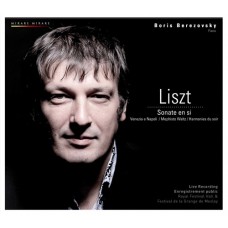您的購物車沒有添加專輯!
搜尋
貝瑞佐夫斯基彈奏李斯特作品 (Berezovsky 貝瑞佐夫斯基 / 鋼琴)
專輯編號: MIR099
專輯類型: 單CD
發行年份: 2013
國際條碼: 3760127220992
音樂家:
庫存狀態: 有庫存
|
Liszt's Transcendental etudes bear the dedication “To Carl Czerny with the deep respect of a grateful pupil”. In its ultimate form, these Romantic poems were incredibly far from Czerny's etudes, with which young pianists are terrorised at school. The title of 'transcendental' points at the exceptional, superhuman technical difficulties which Boris Berezovsky masters with seeming ease. The cycle Years of Pilgrimage was written during travels to Switzerland and Italy when the 24-year-old Franz Liszt had romantically fled Paris with the Countess Marie d'Agoult. The pieces Venezia e Napoli – Gondoliera, Canzone and Tarantella – appeared as an addition to the second, Italian year of L'Annees. The dazzling piano score serves not for a demonstration of virtuosity but rather to create coloratura, or rather a fantastical aura of sound around Italian melodies. “Here, surely, we have the truest successor to the great Russian pianists.” Gramophone “Can you imagine the famous "Revolutionary" Etude played by left hand alone? Hard to believe. But there it was. And, as with everything else in this concert, it was beautifully shaped. That ability to transcend the physical challenges of such preposterously difficult music was part of Berezovsky's secret. And he sustained it throughout five of Liszt's Transcendental Studies. Virtuosity was more a tool rather than an end. And at the close, after a few impeccably shaped miniatures as encores, one was left thinking that Berezovsky is one of the greatest pianists of our time.” Irish Times |
|
Chopin: Waltz No. 5 in A flat major, Op. 42 Liszt: Piano Sonata in B minor, S178 Venezia e Napoli (3 pieces), S. 162 Mephisto Waltz No. 1 Transcendental Study, S139 No. 11 'Harmonies du soir' |
編號 |
曲目 |
長度 |
作詞 |
作曲 |
演奏 |
樂團 |
演唱 |
指揮 |
試聽 |
|---|


